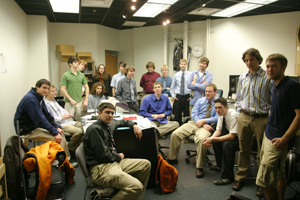The 18 students in the sound recording technology program met with members of the School of Music administration Tuesday night to discuss their grievances with their major. The students said the program lacks a focused curriculum, usable equipment and enough qualified faculty.

The students are employees of Ithaca College Recording Services, responsible for recording all concerts on campus. They threatened to strike if a concrete plan for change was not agreed upon at the meeting.
In a letter to the administration delivered Nov. 17, the students declared they would stop work unless certain conditions were met. At press time, the strike depended upon a final condition — a temporary recording space made available to them by Friday. The students’ main piece of equipment, the SSL recording console, has been in a constant state of disrepair since last spring, according to the students.
Talks among students began in September, and senior Adam Day said they also received support from alumni of the program.
Day said he thinks his education fell short of such a selective program’s potential. Between four and eight students are accepted to it each year from about 100 applicants. Three students from the sophomore class and two students from both the junior and senior classes have left the program because of its insufficiencies, Day said.
“We’ve all come here excited to learn,” he said. “And to be disappointed time and time again is really disheartening.”
Senior Andrew Chapman said the administration listened and expressed a willingness to help at the meeting.
“At this point, a strike seems unlikely, but it is definitely still on the table,” he said.
While students have shared their concerns before, Day said this was the most organized and drastic action they had taken.
“It’s an extreme step to signal some red flags,” he said. “We need to raise the bar to make this program better.”
Though Day, Chapman and the other students were glad the administration agreed with their concerns, they are still prepared to strike if certain conditions are not met.
“It seems like the administration’s first priority is to make sure they can set up some temporary recording spaces for us,” Day said.
Arthur Ostrander, dean of the School of Music, said he was happy to meet with the students.
“Strike or no strike, we would have had this meeting,” he said. “That’s really the last of my concerns. I would much rather make sure that the students have a fair and open opportunity to speak.”
The meeting fostered a “lively” discussion between the students, Ostrander, Associate Dean William Pelto and Associate Provost David Garcia.
Going into the meeting, Ostrander said he wanted the students to understand that the administration and faculty also realized there were weaknesses in the program.
“It’s also been our realization that change is in order,” he said. “It’s important to bring these students and faculty together to make it happen.” Pelto said he has held discussions with students about reworking the curriculum.
“The program is just about eight years old now,” he said. “It’s time for us to evaluate what works and what doesn’t. We’re incredibly dedicated to this program and we see the value of it to the School of Music.”
Senior Peter Morrison was satisfied that the administration took their concerns seriously but is waiting to see what will happen next.
“The problems have not been fixed just by acknowledging them,” Morrison said.
Morrison looks forward to a possible studio space, but is still concerned about the status of the SSL recording console.
“A temporary recording studio is by no means a replacement,” Morrison said. “But we’ll be somewhere between nothing, which is what we had, and full capability.”
Should they choose to strike, 15 concerts this weekend would go unrecorded. For some music students, this means there will be no record of their achievement.
“There are seniors who won’t have their concerts recorded to get into grad school,” Day said. “This is not an attack on students. We apologize, but we need a better education.”







